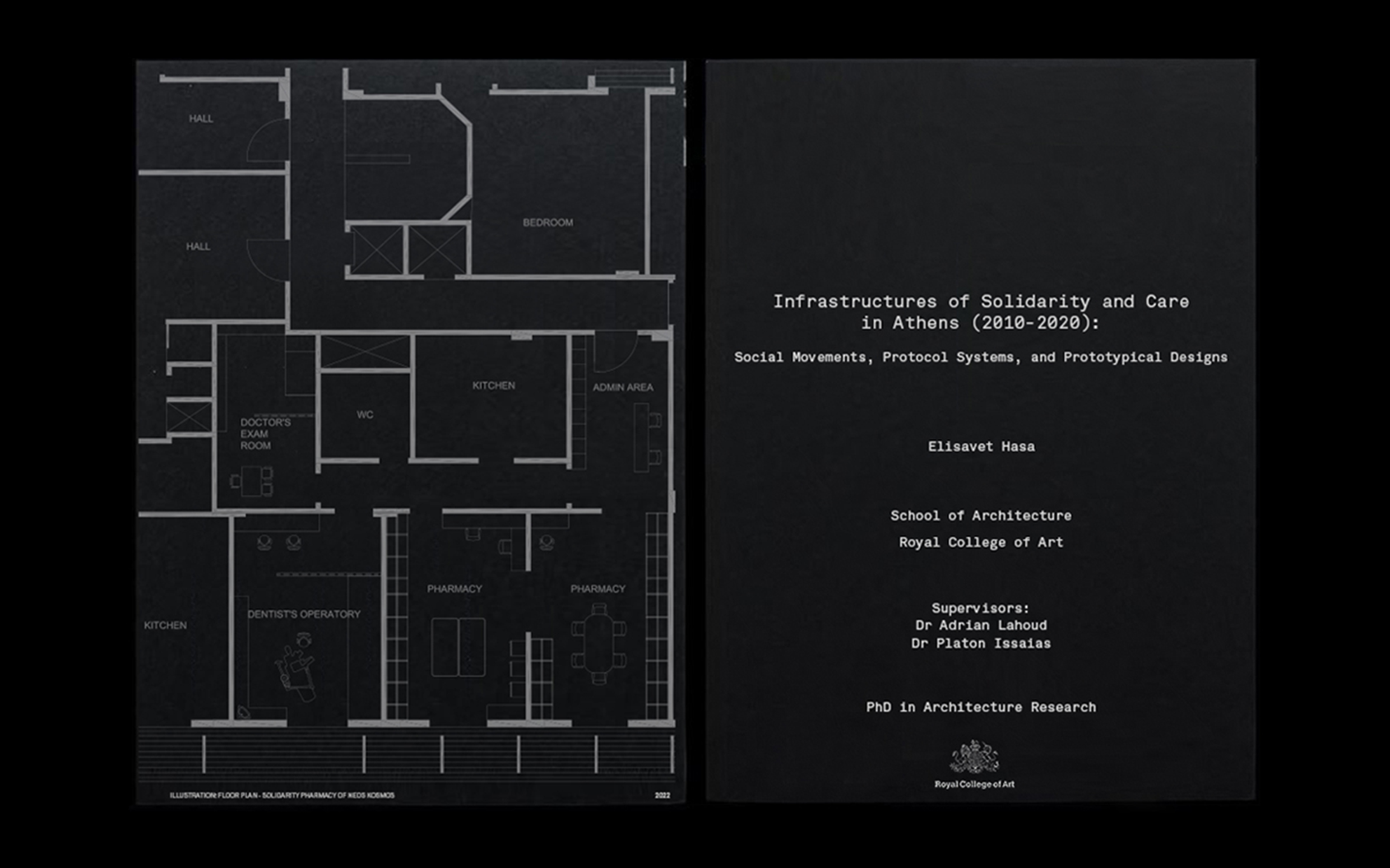

Elisavet Hasa (2022), “Infrastructures of Solidarity and Care in Athens (2010-2020): Social Movements, Prototypical Designs and Protocol Systems,” PhD dissertation, Architecture Research, Royal College of Art, London, UK.
Supervised by: Dr Adrian Lahoud (Royal College of Art), Dr Platon Issaias (Royal College of Art & Architectural Association).
︎︎︎ pgr.rca-architecture.com
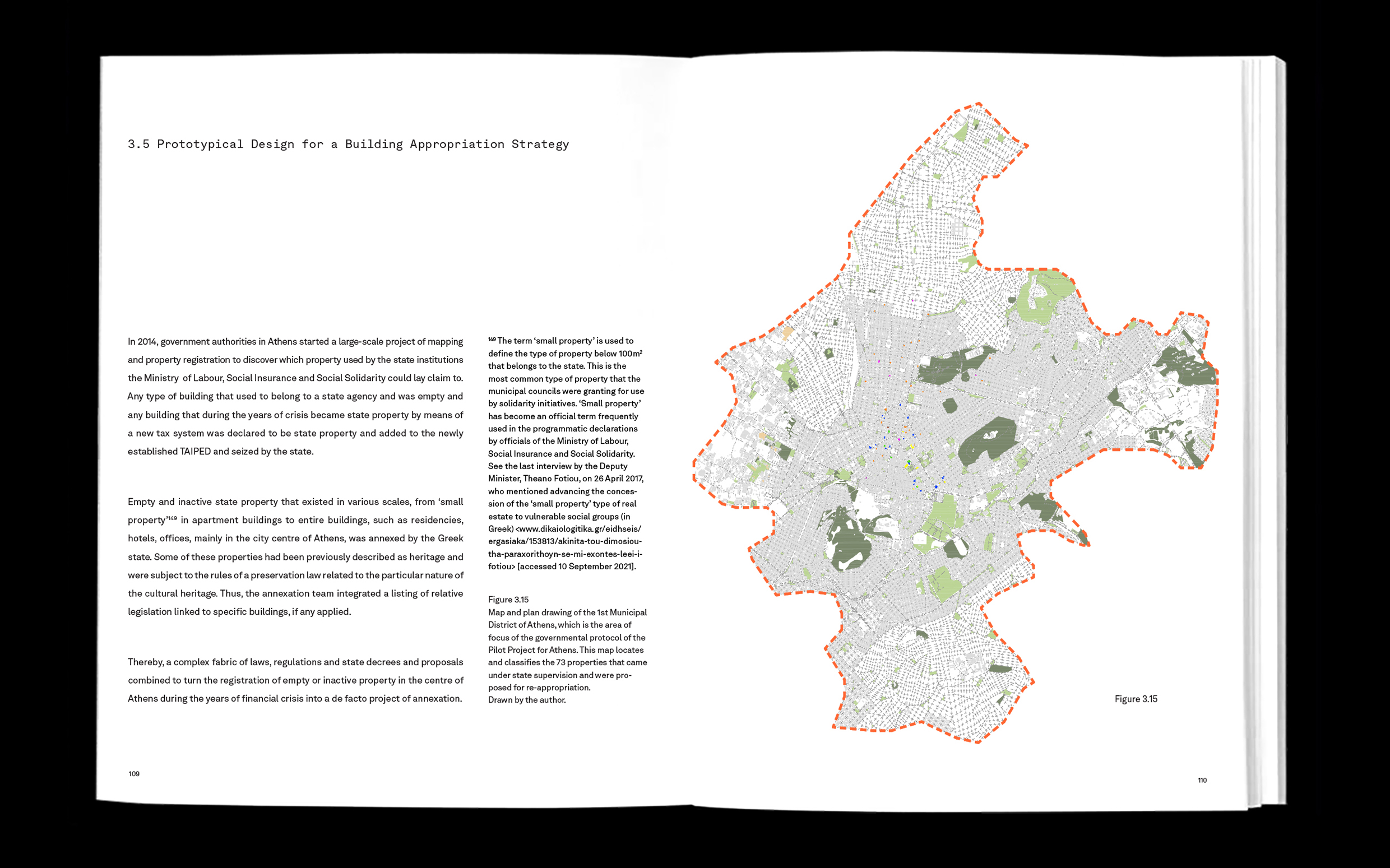





Book pages from my PhD dissertation “Infrastructures of Solidarity and Care in Athens (2010-2020): Social Movements, Prototypical Designs and Protocol Systems,” Architecture Research, Royal College of Art, London, UK.
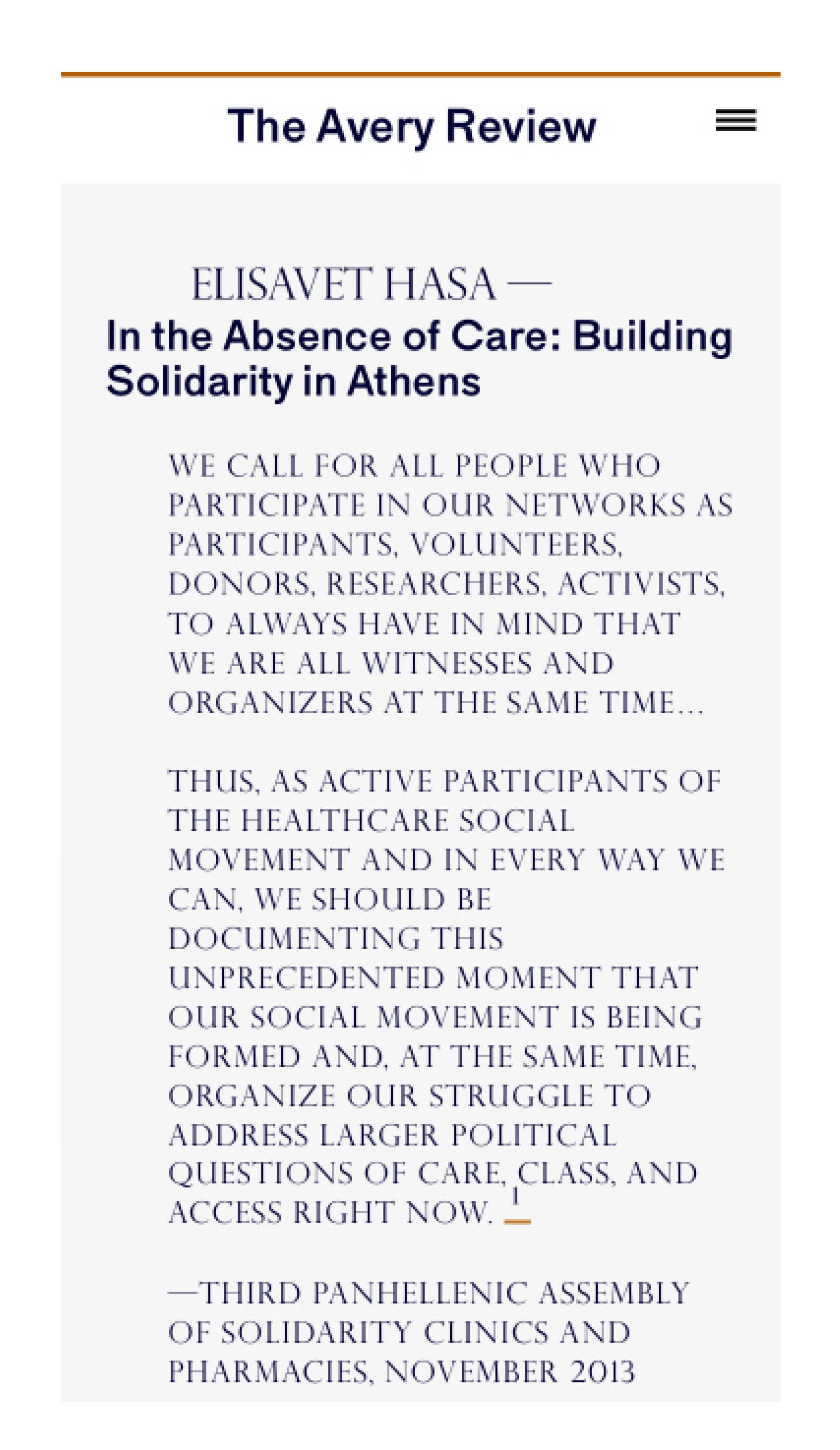 “In the Absence of Care: Building Solidarity in Athens”, essay published in The Avery Review — Critical Essays on Architecture, Issue 54, October 2021.
︎︎︎ Link to the online publication
“In the Absence of Care: Building Solidarity in Athens”, essay published in The Avery Review — Critical Essays on Architecture, Issue 54, October 2021.
︎︎︎ Link to the online publicationA version of the essay “In the Absence of Care: Building Solidarity in Athens” was put together and published in Greek in Archetype — a magazine for architecture, architectural theory and criticism in Greece , February 2022.
︎︎︎ Link to the online publication
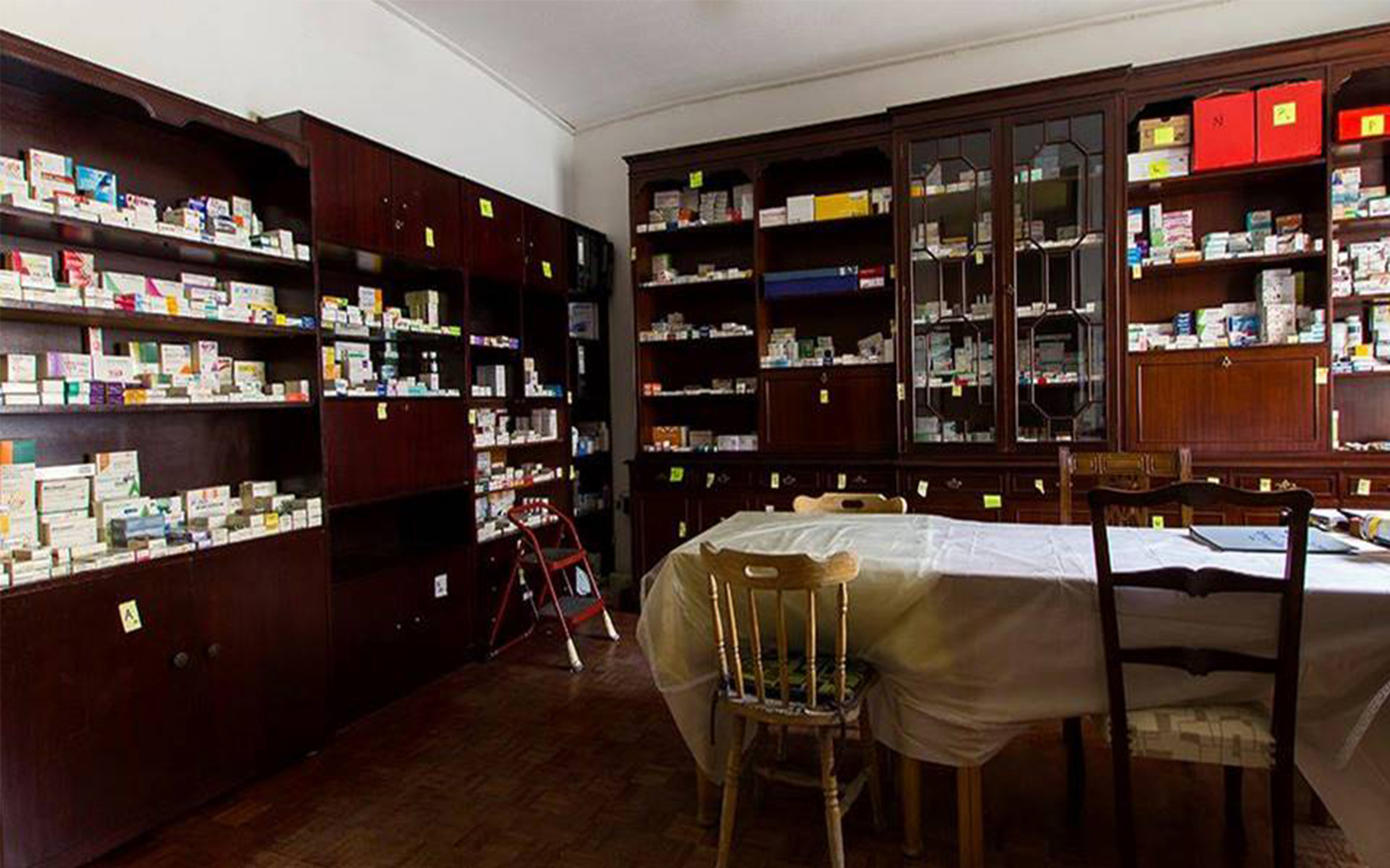



Photo documentation of the solidarity clinics and pharmacies in Athens. All rights reserved.
This essay draws from my doctoral dissertation and traces the materiality of the counter-archive or the “archive of resistance” assembled by solidarity health care initiatives in Athens. This body of work investigates how during the years of financial crisis, the spaces of the solidarity clinics and pharmacies, develop as counter-archives —records of possibility— which contain the tools to contest the architectures of abandonment by the state by providing healthcare services to the most marginalized groups in Greece.





Participation of Fatura Collaborative in the 10th Biennale of Young Greek Architects, 2021, with two projects, awarded both a distinction by the selection committee.
Organised by the Hellenic Institute of Architecture.
Photos from the exhibition, 17 Dec 2021 - 17 Jan 2022, Athens, Greece.


Fatura Collaborative
Project: The Quarry, the Theater, Movies and Beers
Open Concept Design Architectural Competition for the design of the surrounding landscape areas and the supporting infrastructure of Lycabettus Hill Theatre in Athens, Greece (2019)
Awards:
- 3rd Prize at the Open Concept Design Architectural Competition, Greece
- Distinction by the selection committee of the Hellenic Institute of Architecture
- Selection for the 10th Biennale of Young Greek Architects, 2021
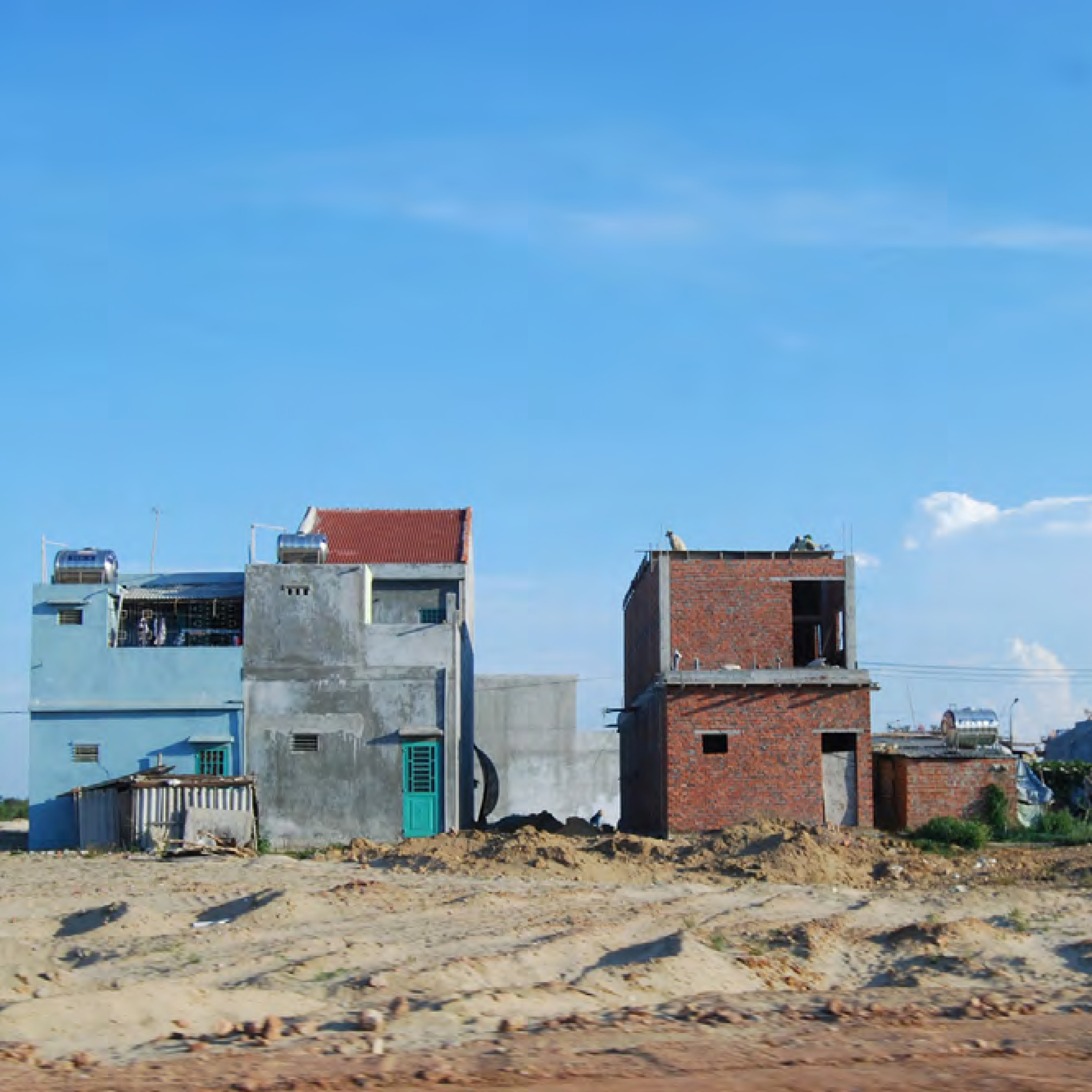
Photo: Da Nang, Vietnam
Our project for an incremental housing system in Da Nang, Vietnam, was awarded a Distinction and was exhibited at the 10th Biennale of Young Greek Architects. This ongoing project of the studio involves a collaboration with local NGOs and employs both legislative and architectural means for the creation of cooperative incremental housing models for migrant workers and displaced smallholders of the area.
Fatura Collaborative
Project: Highways, Dragons and Party Walls
Research and design project for a cooperative, incremental housing protocol for Da Nang, Vietnam (2015-Ongoing)
Awards:
- Distinction by the selection committee of the Hellenic Institute of Architecture
- Selection for the 10th Biennale of Young Greek Architects, 2021









Seminar session by Elisavet Hasa and Olga Balaoura for the Projective Cities programme (Architectural Association):
Wednesday 16 December 2020:
“Decentralised interiorities / Urban policies, public space and the economic geography of Athens”, 5pm Elisavet Hasa & Olga Balaoura.
Part of the “Athens: Virtual Trip” seminars organised and hosted by Projective Cities MPhil in Architecture and Urban Design, Architectural Association, Online (Zoom), Dec 14-18, 2020.
“Athens as a case study, and specifically the neighbourhood of Kaisariani, is the focus of the programme term 2 design exercise. A series of collaborations with the local municipality and various stakeholders, academic institutions, practitioners and activists, present and expose AA students in the city’s complex urban and social history, aiming to rethink urban and architectural design practices within the context of 21st century ecological, social, economic and political challenges.
The city and the neighbourhood of Kaisariani serve as sites of research and design experimentation, focusing on the development of new housing typologies, renovation projects and various public and collective equipment, while rethinking and promoting the legacy of the refugee population and its social, cultural and political histories and their registry in spatial and design protocols.
Guest lectures and seminars by: Nikos Belavilas, Katerina Christoforaki, Polina Prentou (Urban Environment Laboratory), Panagiotis Tournikiotis, Dimitris Chatziioakeimidis, Maria Marlanti, Thanos Pagonis, Kostantinos Serraos, Mikela De Tchaves, Olga Balaoura, Elisavet Hasa, Lila Leontidou, Thomas Maloutas, Iris Lykourioti.
Evening public lectures by Aristide Antonas and Tilemachos Andrianopoulos.”
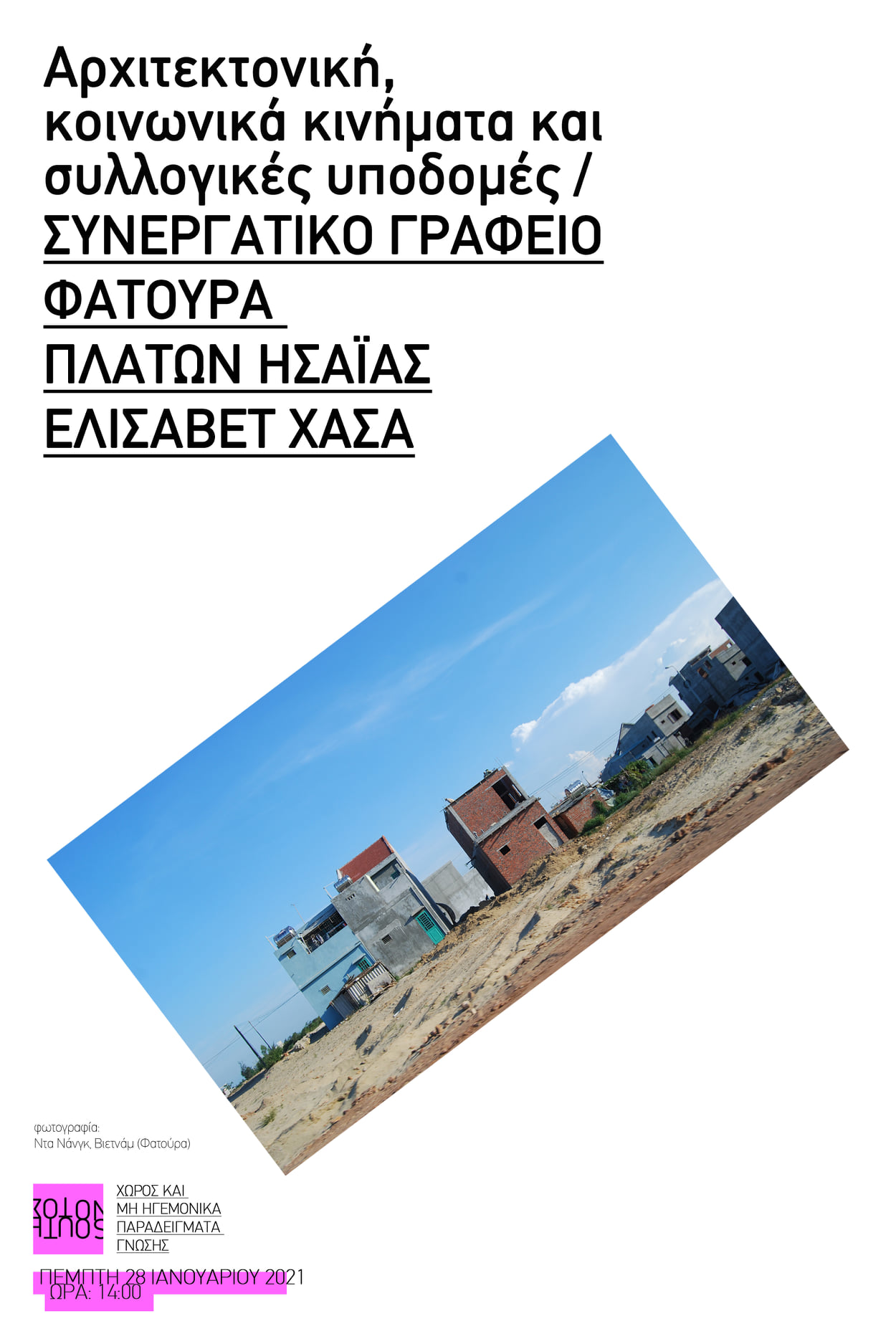
Public lecture by Fatura Collaborative, Platon Issaias and Elisavet Hasa: “Architecture, social movements and collective equipments”, Department of Architecture, University of Thessaly. Online (Zoom), Jan 28, 2021.
︎︎︎ Website of the event
Description:
“Taught and directed by Prof Iris Lykourioti the course “South: Space and non hegemonic paradigms of knowledge” aims at bringing the students in contact with alternative paradigms of knowledge and practices of designing space and with alternative forms of the architectural profession, ones that emerge within different social, productive and political circumstances and contradictions that exist in different parts of the world.”
Participation in the “Economies of Exhaustion: The Ethics of Academic, Architectural, Artistic Labour" symposium, organized by the Bartlett School of Architecture. Round table discussion Elisavet Hasa, David Roberts (UCL) and the United Voices of the World – Section of Architectural Workers (UVW-SAW). February 5, 2020, 2:00pm–5:00pm. London, UK.︎︎︎ Website of the event
Description:
“At the first event in a new series, Professors Jane Rendell and Peg Rawes host talks and conversations around the theme of ‘economies of exhaustion’, drawing on debates in critical university studies and feminism around care and precarity, as well as ecology, equity and ethics. Discussions will cross-cut with university initiatives around equality, diversity and inclusivity and responses to the climate emergency, exploring contemporary concerns regarding work and labour.
The first conversation, chaired by Jane Rendell, through The Bartlett Ethics Commission, includes presentations from Claudia Dutson, Elisavet Hasa, Sophie Hope, Jenny Richards, David Roberts and Igea Troiani, and will focus on work and labour in art, architecture and academia.”
Paper presentation at the PhD Symposium organised by the PhD Programme of the School of Architecture, Royal College of Art, Online (Zoom), March 12, 2020.
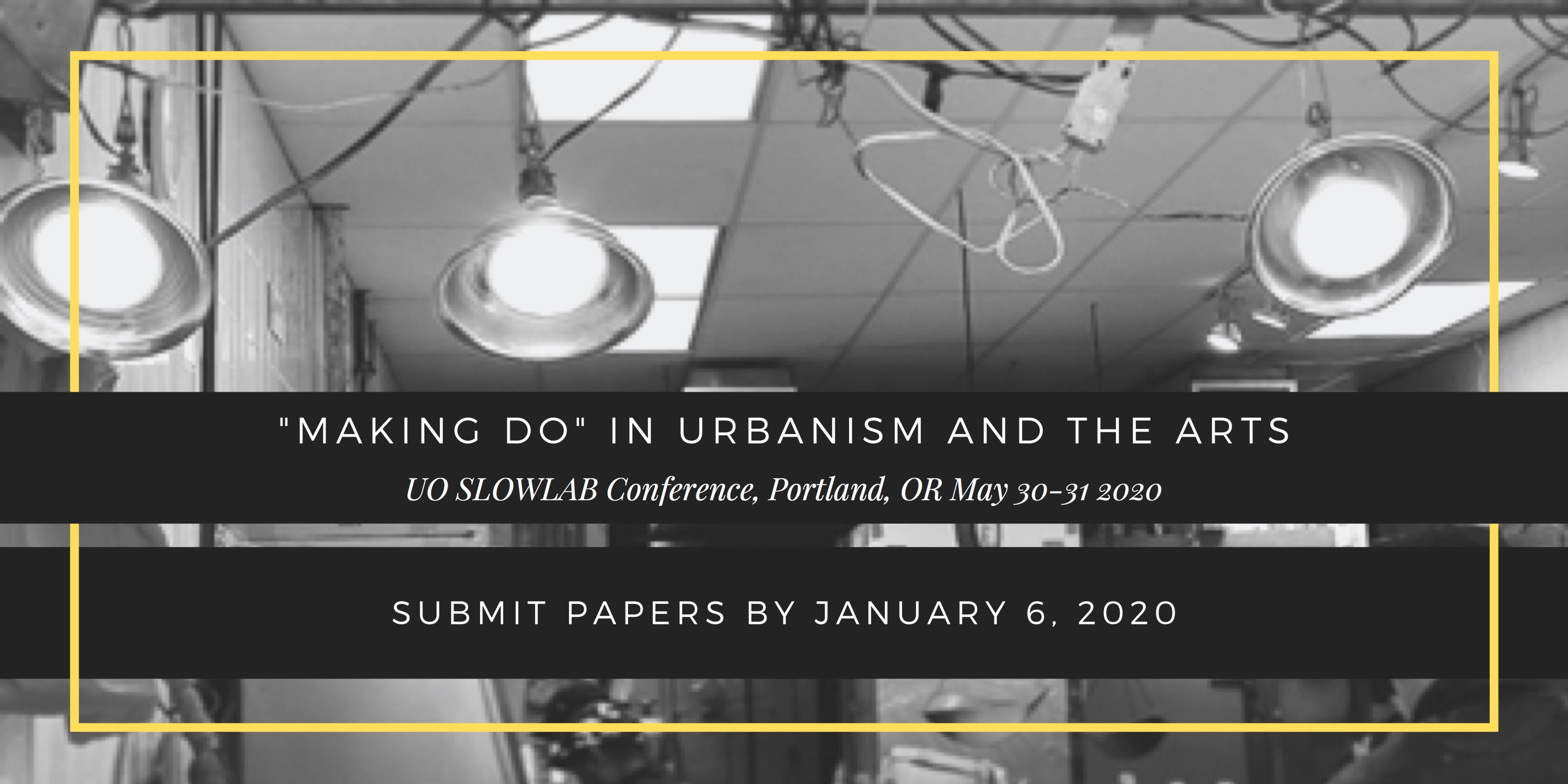
Participation in the panel discussions on "Making-Do" in Urbanism and the Arts, modes of fixing and/or adapting urban spaces by those in precarious, marginalized or at-risk communities, as an act of staking claim to place.
Elisavet Hasa, “The Constitution of Solidarity Clinics and Pharmacies as Spaces for Collective Care and the Effects on Marginalized groups in Greece,” Conference paper.
Conference organized by the UO SLOW LAB, College of Design, University of Oregon,
Online (Zoom), Nov 20, 2020. ︎︎︎ Website of the event
Elisavet Hasa, “The Constitution of Solidarity Clinics and Pharmacies as Spaces for Collective Care and the Effects on Marginalized groups in Greece,” Conference paper.
Conference organized by the UO SLOW LAB, College of Design, University of Oregon,
Online (Zoom), Nov 20, 2020. ︎︎︎ Website of the event
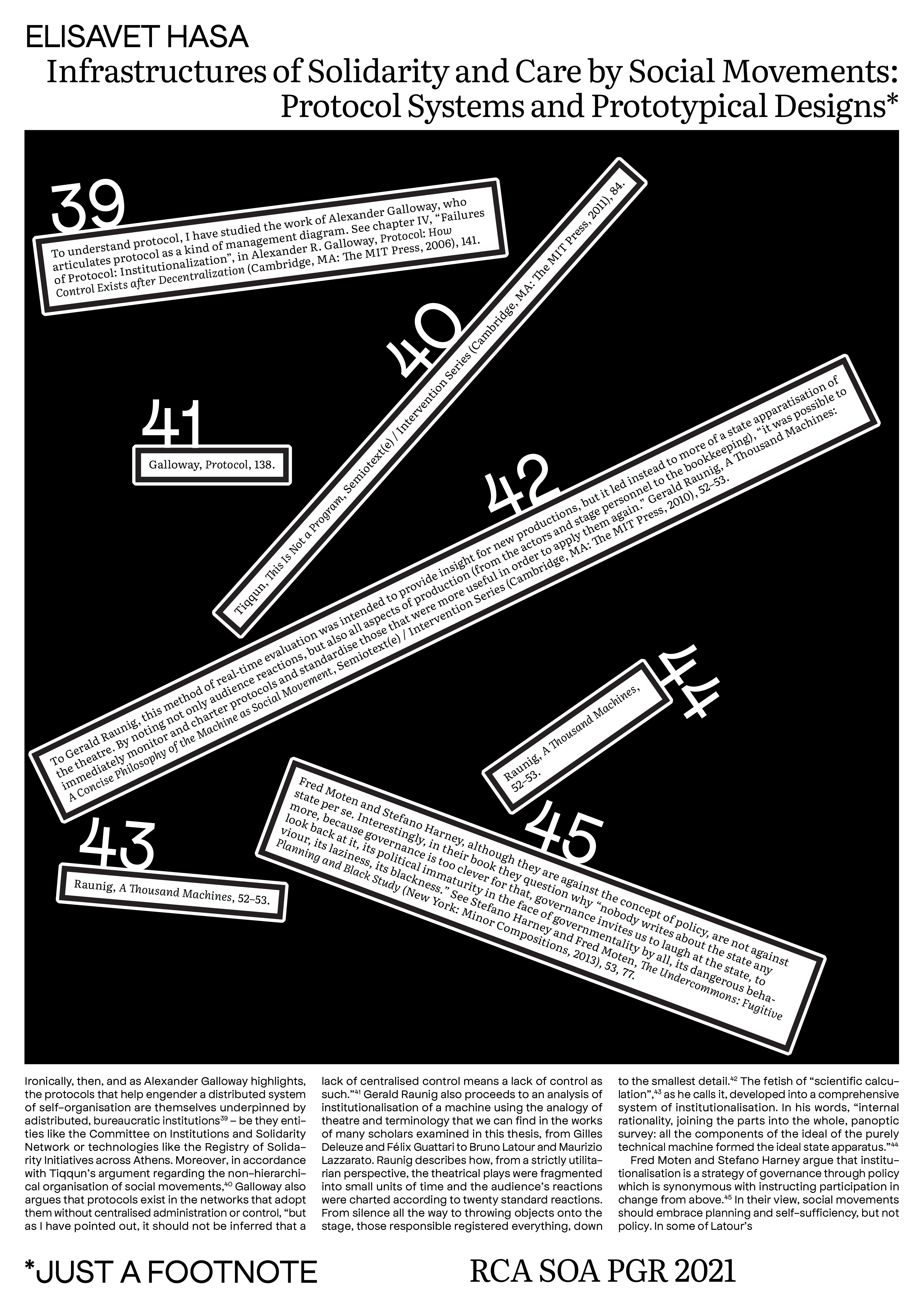
Participation in the “Research Biennale” Online Exhibition organised by the Research programmes at the Royal College of Art, February 2021.
Elisavet Hasa, PhD candidate, title of project: “Infrastructures of Solidarity and Care by Social Movements: Protocol Systems and Prototypical Designs”, Architecture Research.
︎︎︎ research-biennale.rca.ac.uk
Participation in the “Structural Instabilities: History, Environment, and Risk in Architecture” symposium, PennDesign, Philadelphia, PA, Apr 5—6, 2018.
︎︎︎ Website of the event
This symposium explored how the structural instabilities of the 21st century are legible in histories of architecture and related spatio-political disciplines, insofar as they engage questions of economy, gender, race, and environmental change.
Symposium Convened By:
Daniel A. Barber, Sophie Hochhäusl, Eduardo Rega Calvo, and Naomi Waltham-Smith.
Keynote by Felicity Scott, Columbia University GSAPP
Productive Vulnerabilities
Friday, April 6, 2018
Panel 3 10:00am - 12:15pm
Elisavet Hasa, Royal College of Art:
The Rise of Solidarity Movements and the Architecture of Collective Equipment in Athens during the Years of Crisis
Susanne Schindler, ETH Zurich:
The Model Cities Program: Productive Instabilities
Maros Krivy, University of Cambridge and Estonian Academy of the Arts:
Urban Complexity: A Fad?
︎︎︎ Website of the event
This symposium explored how the structural instabilities of the 21st century are legible in histories of architecture and related spatio-political disciplines, insofar as they engage questions of economy, gender, race, and environmental change.
Symposium Convened By:
Daniel A. Barber, Sophie Hochhäusl, Eduardo Rega Calvo, and Naomi Waltham-Smith.
Keynote by Felicity Scott, Columbia University GSAPP
Productive Vulnerabilities
Friday, April 6, 2018
Panel 3 10:00am - 12:15pm
Elisavet Hasa, Royal College of Art:
The Rise of Solidarity Movements and the Architecture of Collective Equipment in Athens during the Years of Crisis
Susanne Schindler, ETH Zurich:
The Model Cities Program: Productive Instabilities
Maros Krivy, University of Cambridge and Estonian Academy of the Arts:
Urban Complexity: A Fad?
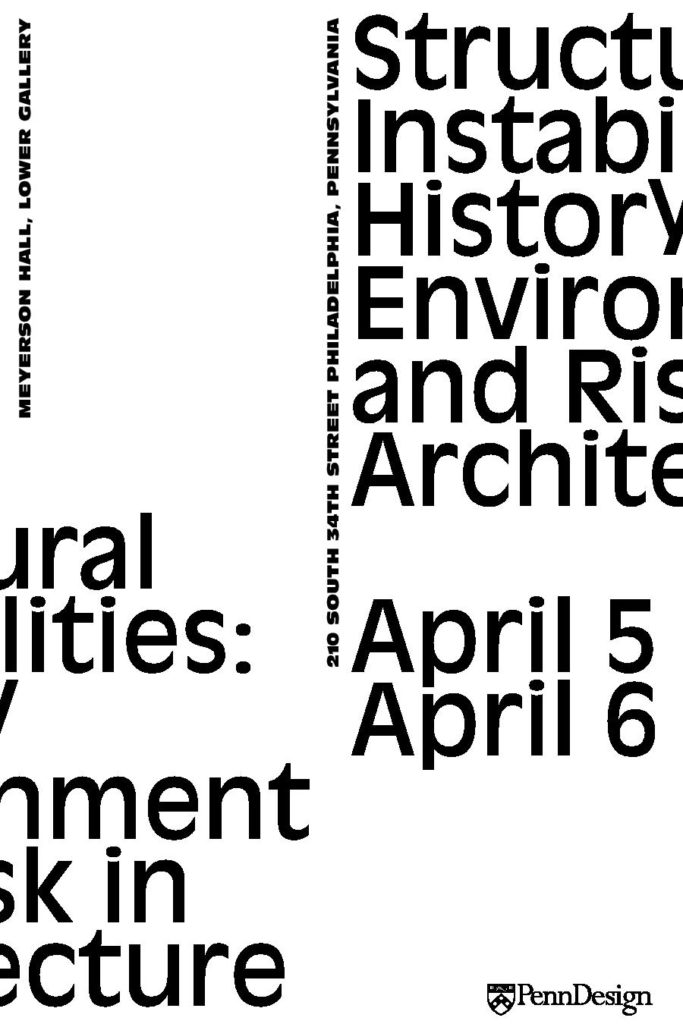
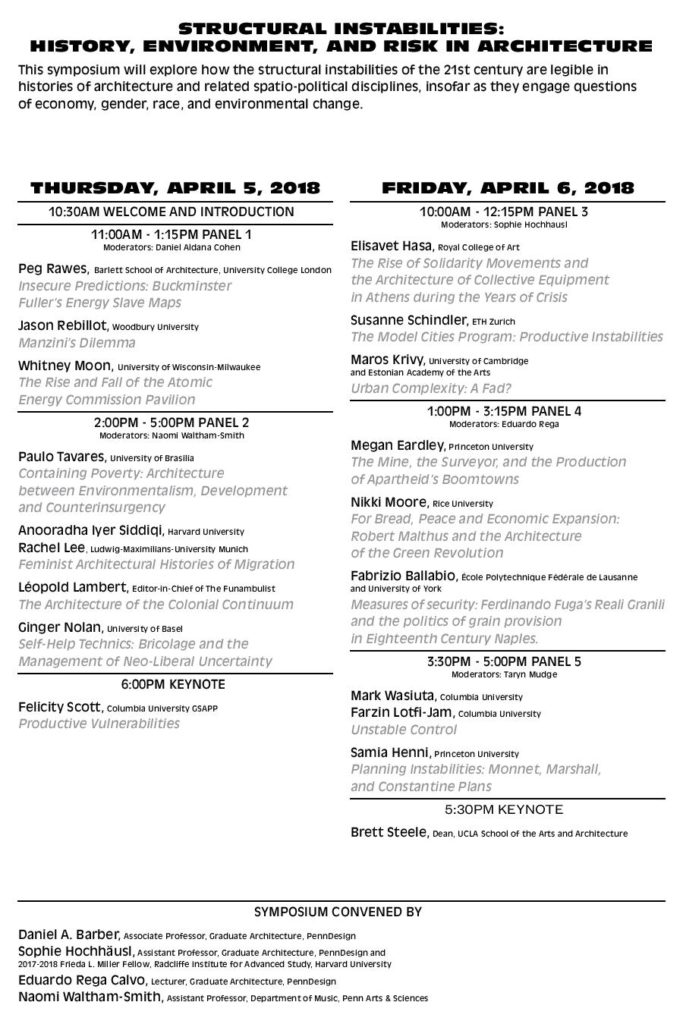

T-A-L Earth Week: Green New Deal
︎︎︎ architecture-lobby.org/event/t-a-l-earth-week-2020
In solidarity with the global climate movement, the chapters of The Architecture Lobby organized a series of international events reflecting on the difficult relationship between architectural work and climate change.
As the steward of the Lonon chapter of TAL, I organised a conversation with organisers from the field of architecture to discuss sustainability, justice and solidarity in the architectural profession.
Saturday, April 25
Global Crises: Covid-19 & Climate Change
The Architecture Lobby London (UK), 7:00pm BST / 2:00pm EDT / 11:00am PDT / 6:00pm GMT
Description: “This discussion brings together Anna Lisa McSweeney (Architects Climate Action Network – ACAN) and Stephanie Edwards (Urban Symbiotics, RIBA London Councillor) in conversation with Elisavet Hasa (T-A-L) to address how the ongoing climate change crisis, especially amidst this pandemic, affects the ways architects are organizing around working conditions and gender equality, and our demands on housing.”

Stephanie Edwards (Urban Symbiotics,
RIBA London Councillor)

Anna Lisa McSweeney (Architects Climate Action Network – ACAN)

Elisavet Hasa (T-A-L)
Architecture Lobby expresses solidarity with UK’s architectural assistants
Op-Ed published on Archinect on 24 March 2021
︎︎︎ Link to the full letter



In 2016, I was an architect-member of the cooperative assembled to introduce a new participatory planning process for the curation of the national participation of Greece in the 15th Venice Biennale “Reporting from the Front”. The main aim of our participation as a cooperative of architects was to redefine the role of architecture as a collective work in response to the constant struggle of everyday life for social consensus and justice. In practice, by following the format of the assembly for decision-making and of participatory design for the group projects we aimed to challenge both the role of architecture and the architect-reporter who covers the upshots right from the locus of crisis, while is still acting, struggling and putting forward new claims.
Full list of the members/participants can be found at the official website of the Venice Biennale: ︎︎︎ labiennale.org/en/architecture/2016/national-participations
#ThisIsACo-op Greek pavilion at the 15th Venice Architectural Biennale consists the Greek reporting from the front and reflects a collective attempt to
integrate responses from multiple fronts of diverse crises that the
society, the economy, space, spatial planning, the architectural profession and the standard of living are undergoing in Greece since the beginning of the financial crisis.
A full description of the collective process to curate #ThisIsACo-op can be found in the 16-page booklet released by the collective in the PDF here: ︎︎︎ PDF
![]()
![]()
![]()
![]()
society, the economy, space, spatial planning, the architectural profession and the standard of living are undergoing in Greece since the beginning of the financial crisis.
A full description of the collective process to curate #ThisIsACo-op can be found in the 16-page booklet released by the collective in the PDF here: ︎︎︎ PDF
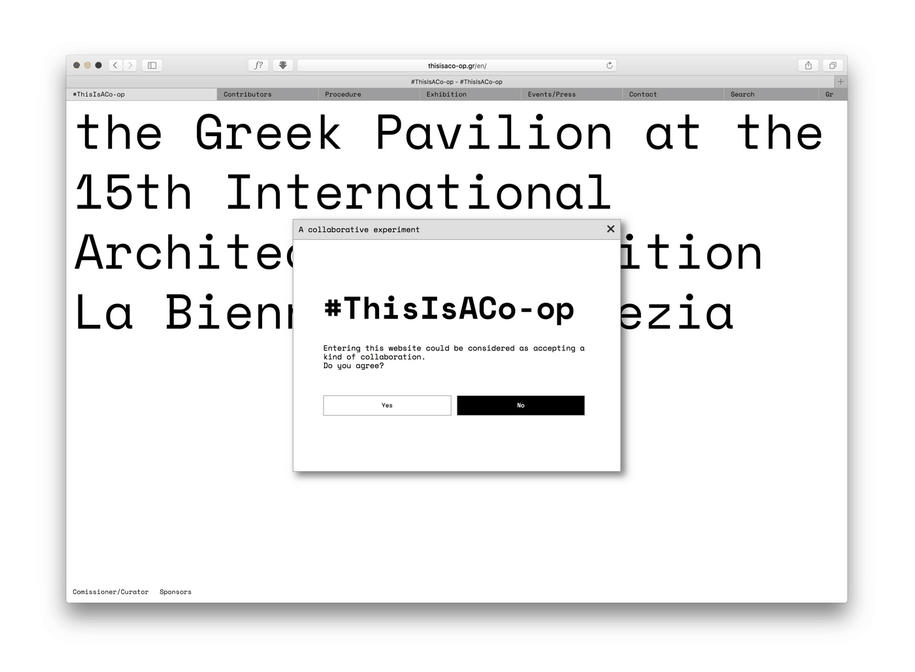



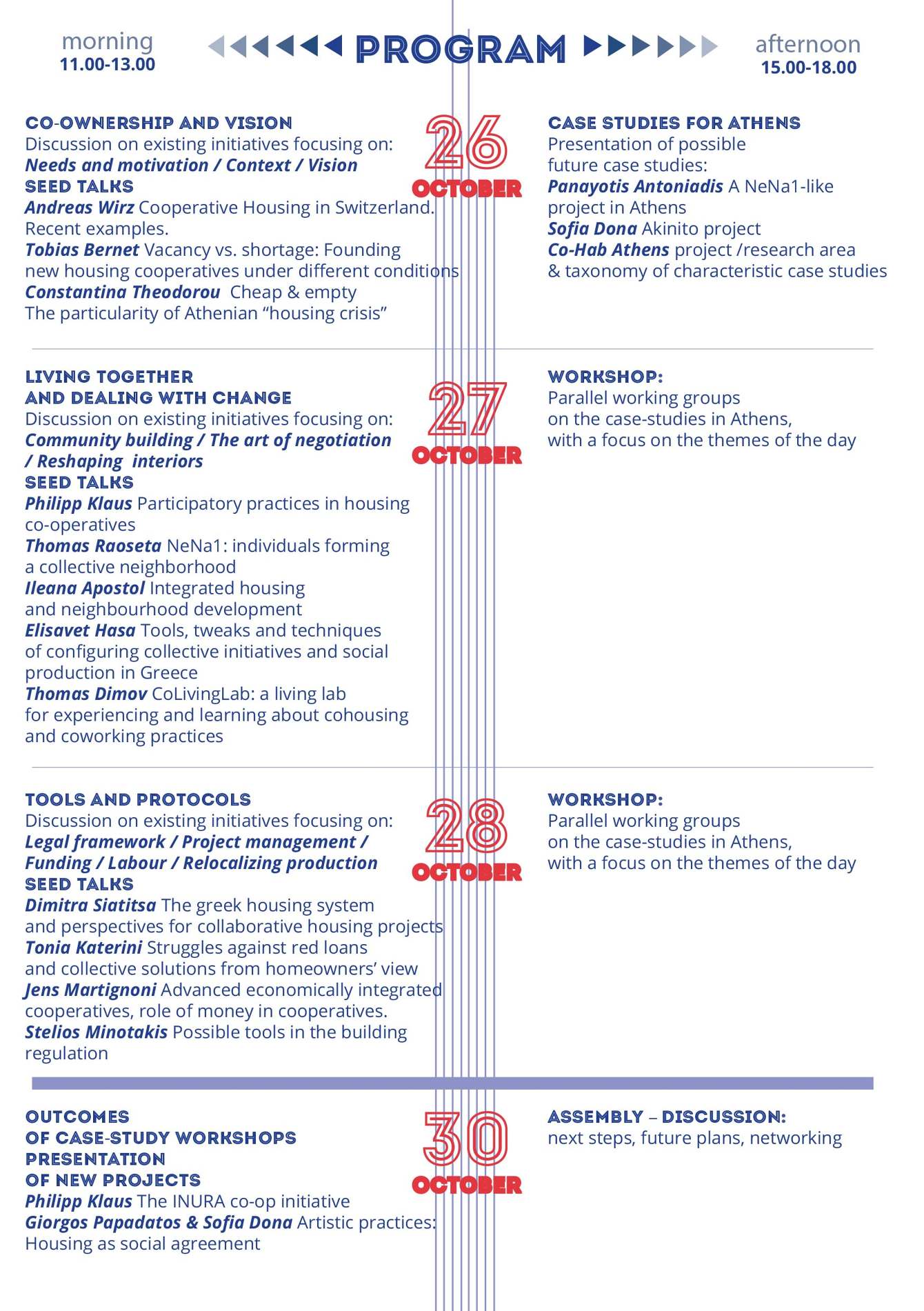
In 2016 I co-founded Cohab Athens a cooperative that explores alternative housing models through self-management and collective ownership tools. As participants of the Greek pavilion we also organized a 4-day workshop on co-housing practices that brought together urban practitioners and members of cohousing projects from Zurich, Leipzig and Athens to share their expertise, collaborate and examine the prospect of a realistic implementation of co-ownership and cooperative housing models in Athens.︎︎︎ Co-housing Practices/Inventing prototypes for Athens project
︎︎︎ Official Press Release of the event
Considering the ideologic collaborative aspect of #ThisIsACo-op project involving 137 participants in an ongoing architectural co-op (between a Coup d’état and a cooperation) Cohab Athens did not want to intervene with a design. Instead, we formed alliances with other cooperative housing collectives across Europe to highlight common goals, exchange experiences and create a manual for the design of cooperative housing projects.
︎︎︎ Cohab Athens project for the 15th Venice Biennale
![]()
![]()
Photos from our workshop, Greek Pavilion, The Giardini, Venice Biennale, Venice, Italy, October 2016.
︎︎︎ Cohab Athens project for the 15th Venice Biennale


Photos from our workshop, Greek Pavilion, The Giardini, Venice Biennale, Venice, Italy, October 2016.
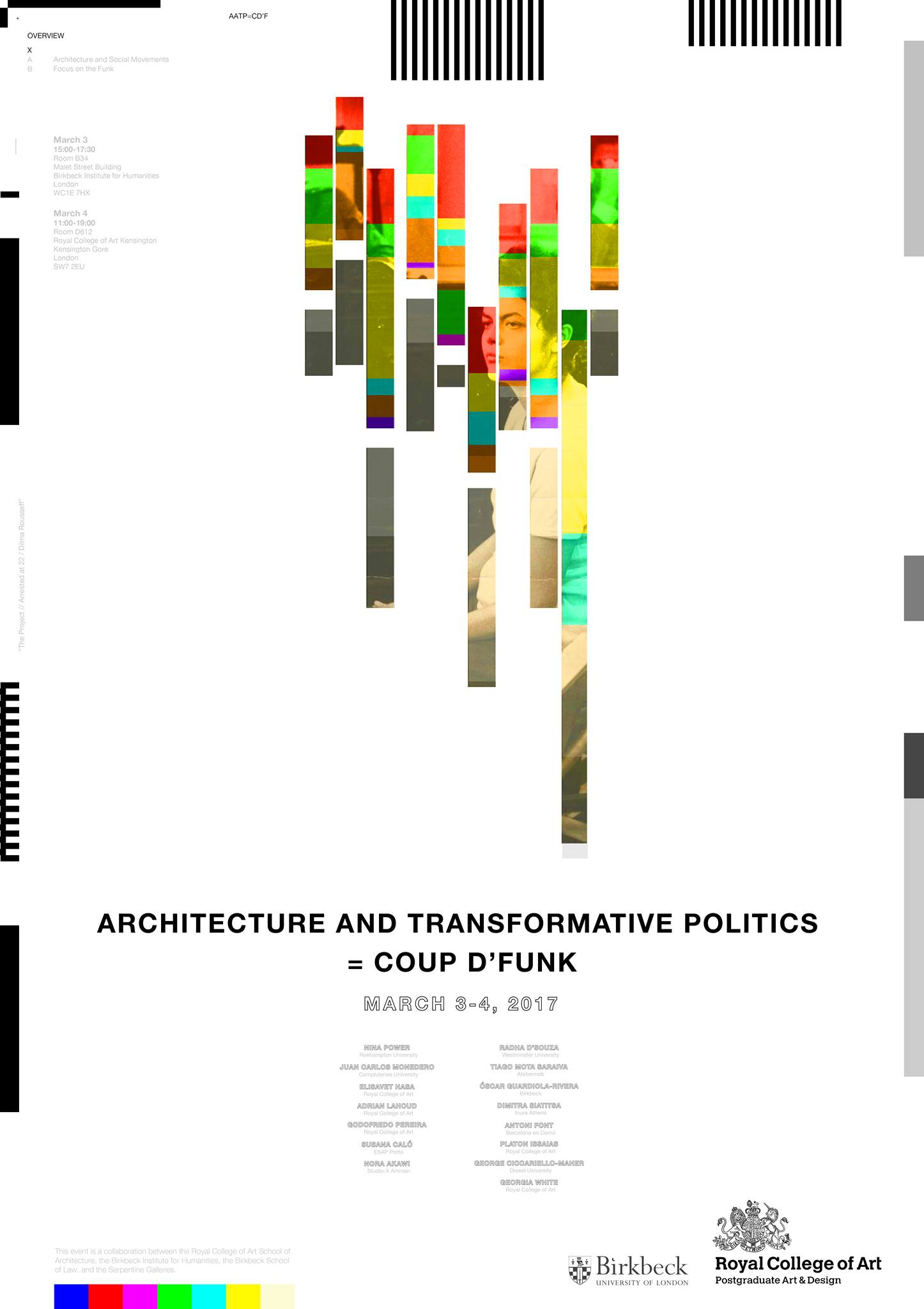
Respondent at the “Architecture and Transformative Politics = Coup d’Funk” symposium, Royal College of Art & Birkbeck, March 3—4, 2017
︎︎︎ Full programme as published on e-flux
Organized by Godofredo Enes Pereira and Óscar Guardiola-Rivera. A collaboration between Architecture & Social Movements Network (RCA) + Focus on The Funk (Birkbeck).
The two-day seminar posed the following questions: what design, research and collaboration methods have to be developed so that the spatial problems of social movements can be adequately described and addressed? How can organizations that emerge out of social movements continue to learn from them? How can academic institutions and design practices develop alliances with popular organizations and movements? What forms of struggle and militancy are required for the development of counter-hegemonic projects?
Day 2: 10:45am–6:30pm
Royal College of Art, Kensington Campus
Introduction: Nora Akawi (Studio-X Amman)
Panel: Dimitra Siatitsa (Inura Athens)
Re: Elisavet Hasa (RCA)
Discussion
Students from London visit "Solidarity for All" in Athens (11/01/2017)
Post retrieved from the website of the Athens-based solidarity collective “Solidarity for All” that provides food, pharmaceuticals and other resources to people and organisations in need across Greece. ︎︎︎ Link to the Solidarity for All website
The visit was conducted as part of the field trip to Athens in January 2017 of the students and tutors of ADS7 “Ecologies of Existence: The Architecture of Collective Equipment”, School of Architecture, Royal College of Art.
Post translated from Greek to English:
“A group of 16 postgraduate students visited the offices of ‘Solidarity for All’ from the School of Architecture at the Royal College of Art in London, under the supervision of their professor, Godofredo Pereira, during a five-day visit in Athens. The visit had as an aim for the students to learn about the operation of the “Solidarity for All”, the social solidarity economy and the solidarity initiatives in Greece.
The students specialize in "The Architecture of Collective Equipment" (re: The Architecture of collective equipment in times of crisis and conflict) and in their previous semester, they studied Gaza and Palestine and in particular, models reconstruction and solidarity.
With them was the doctoral student Elisavet Hasa who studies the solidarity movements in Greece during the years of the financial crisis and the transformation of space at the urban level, especially based on the legislation that includes them (social solidarity economy) and their relationship with state institutions.
At the same time, during the meeting, views were exchanged on the operation and support of the structures that had a decisive contribution to the refugee issue and the humanitarian crisis, while the discussion focused on the current condition of solidarity projects and the development of the Social Solidarity Economy sector.
Immediately after the briefing, a discussion followed on the socio-political situation in Greece, Europe, but also internationally, while in the coming days the student cohort will have the opportunity to visit and see closely the work of solidarity structures in the neighbourhoods of Athens alongside their fieldwork instructors and tutors.”
 Photo from the visit at Solidarity for All, Athens, 2017.
Photo from the visit at Solidarity for All, Athens, 2017.During 2016/2017 & 2017/2018 as part of the Architecture and Social Movement Network at the RCA, I conducted research and organised seminars to explore a series of urgent questions related to activism, territorial conflicts, and architecture’s role in situations of contingency.
Workshop by Mark Wasiuta at the “Existential Territories” research group, Royal College of Art, 2017.


Publication of the essay I wrote as part of the #ThisIsACo-op curatorial team and was published in the Catalogue of the Greek participation #ThisIsACo-op at the Venice Biennale, titled "Out of Architecture? The Exodus and a Multitude of Outcomes," (2016).
This piece of writing belongs to the thematic "Crisis of the Profession", one of the themes set by the curatorial team —Association of Greek Architects (SADAS-PEA), and highlights the transformation of the architectural profession during the years of crisis in Greece with an emphasis on the participation of architects in collectives and local interventions for urban commons.
A copy of the essay can be found on my ResearchGate profile: ︎︎︎ Link



Essay titled "Architecture or Re-claim? The role of architecture in contemporary urban space," published in Architectones magazine ed. by the Association of Greek Architects (SADAS-PEA) (Oct 2015).
A version of the essay in English can be found on my ResearchGate profile: ︎︎︎ Link
Original publication in Greek: “Αρχιτεκτονική ή Διεκδίκηση; Ο ρόλος της αρχιτεκτονικής στον σύγχρονο αστικό χώρο,” ΑΡΧΙΤΕΚΤΟΝΕΣ-Περιοδική Έκδοση του ΣΑΔΑΣ-ΠΕΑ, issue: 16, October 2015, pp. 12—13. ︎︎︎ Link to the online publication

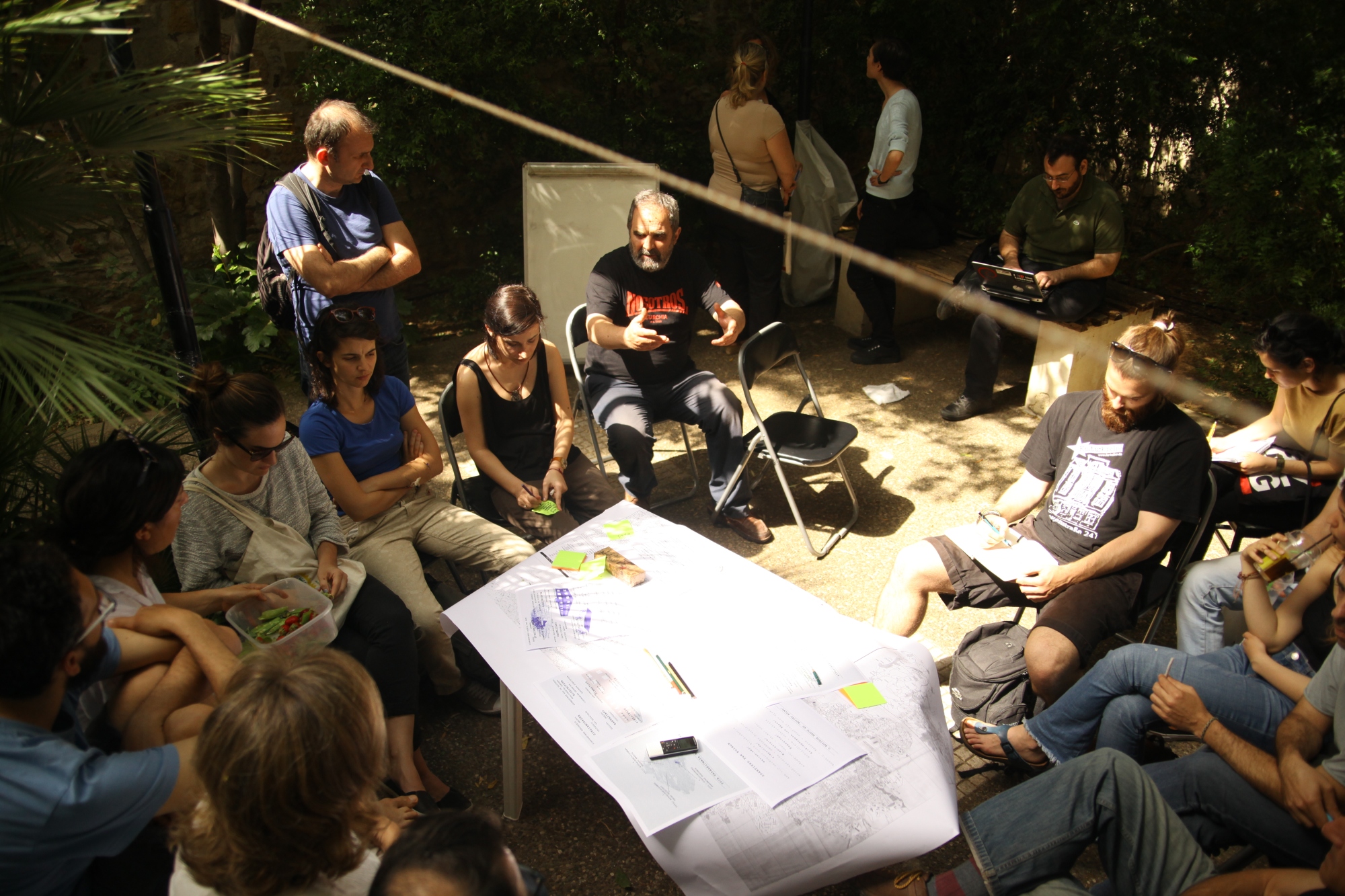


Workshop organised as part of the CommonsFest Athens in 2015 by the collective group Koino Athina I co-founded in Athens.
The detailed festival programme can be found here.
Description:
“The 3rd CommonsFest will host community practices, experiences and artifacts, as well as discussions on how to expand the Commons as a sustainable model for addressing human needs. Participating communities, social movements and emerging social economy stakeholders will explore synergies, enhance networks, and chart a common course towards empowering the Commons.
The festival will host 12 workshops and discussions on specialized subjects, such as security and privacy on the Internet, currency reform, urban commons practices and the role of women in the Commons.
CommonsFest 2015 will also host the founder of the free software movement Richard Stallman, and the economists Massimo de Angelis and Pat Conaty.”

Antonas Office (Aristides Antonas, Katerina Koutsogianni, Elisavet Hasa) participated in the Lisbon Triennale 2013, under the theme “Planning for Protest” curated by Close Closer.
During my time in the office (2013-2014) we developed the protocols for Syntagma Square to be included in the line of protocols that Antonas Office has developed during the last years to speak about the reconceptualisation of urban space of Athens.

Excerpt from the description of the Protocol:
“Syntagma Square is transformed into a visible part of an alternative parliament, ruled through the internet; Athens is a node of the international system of infrastructures. The steps host long tables provided with power and access to the internet. The square serves as an open call for proposals of new urban protocols, applications that can be used by inhabitants of a city block or other ad hoc formed groups of people.”



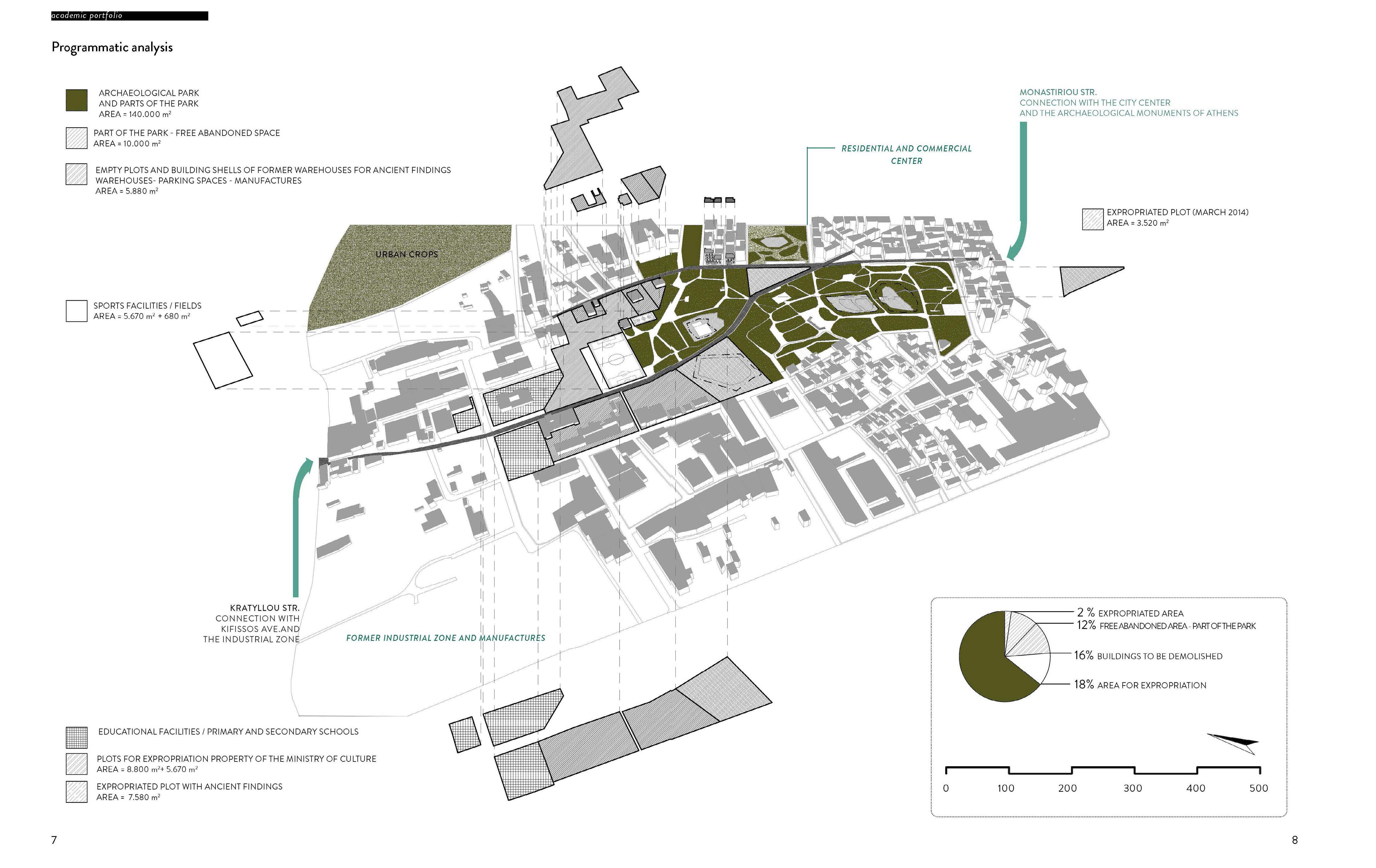


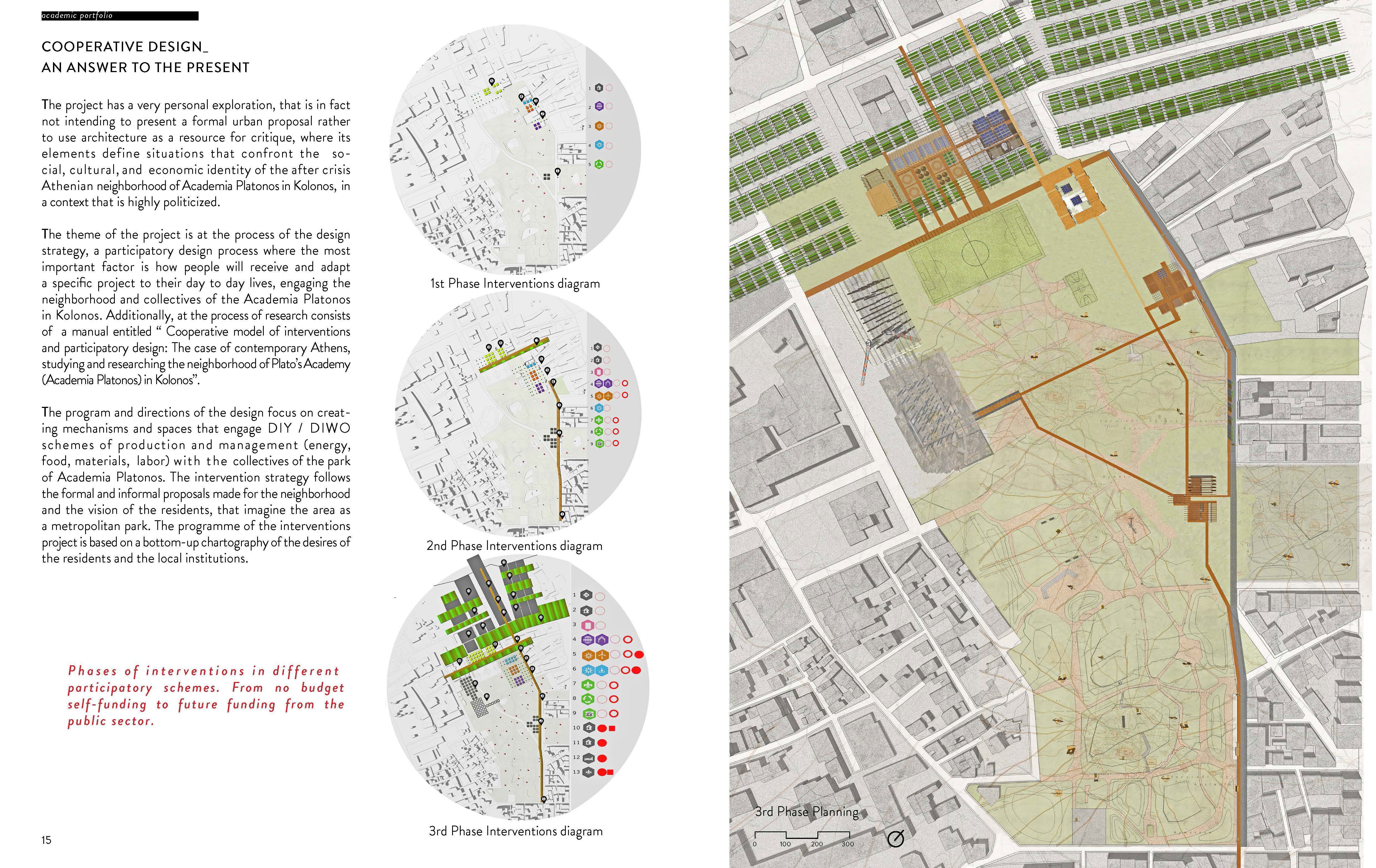




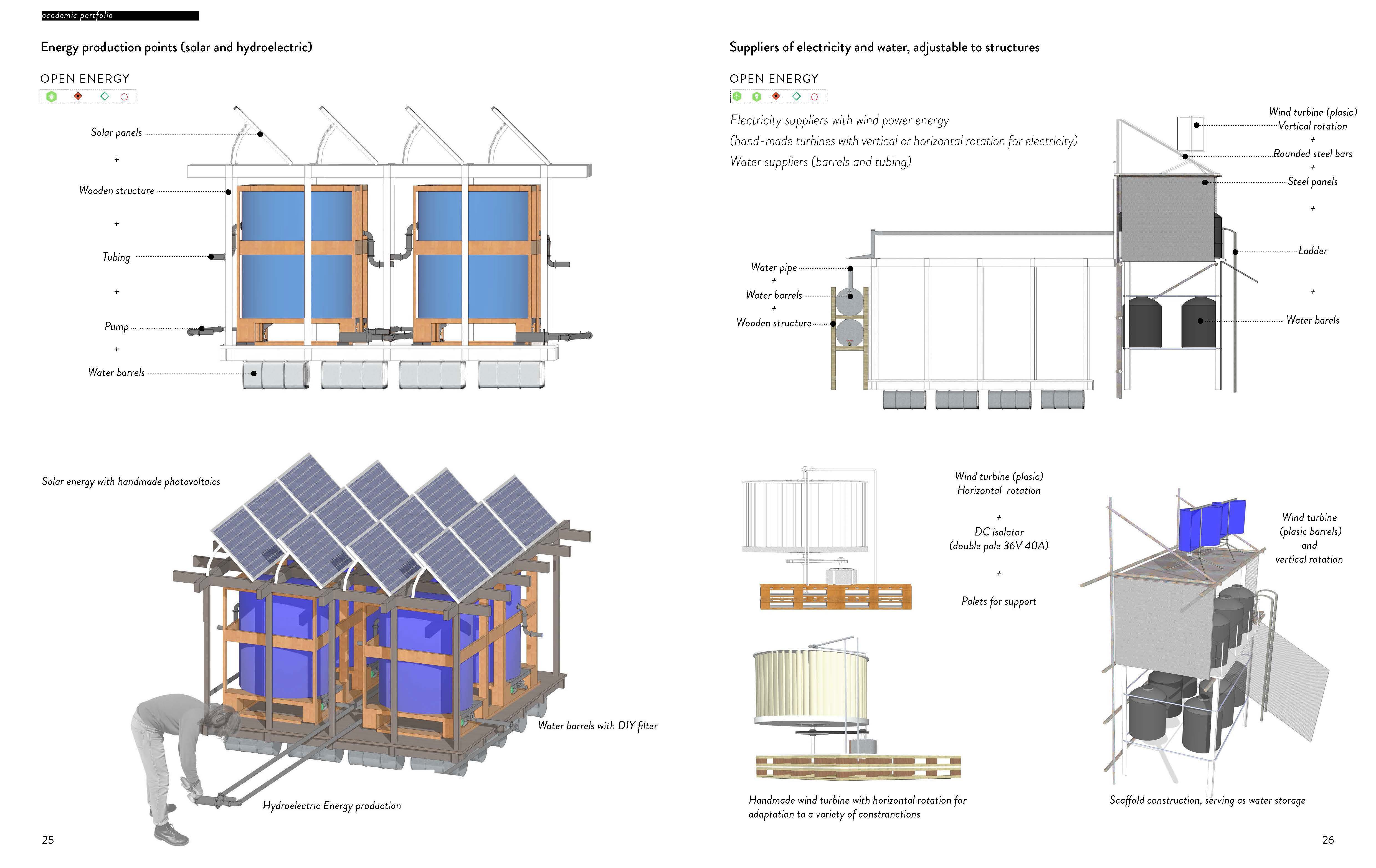
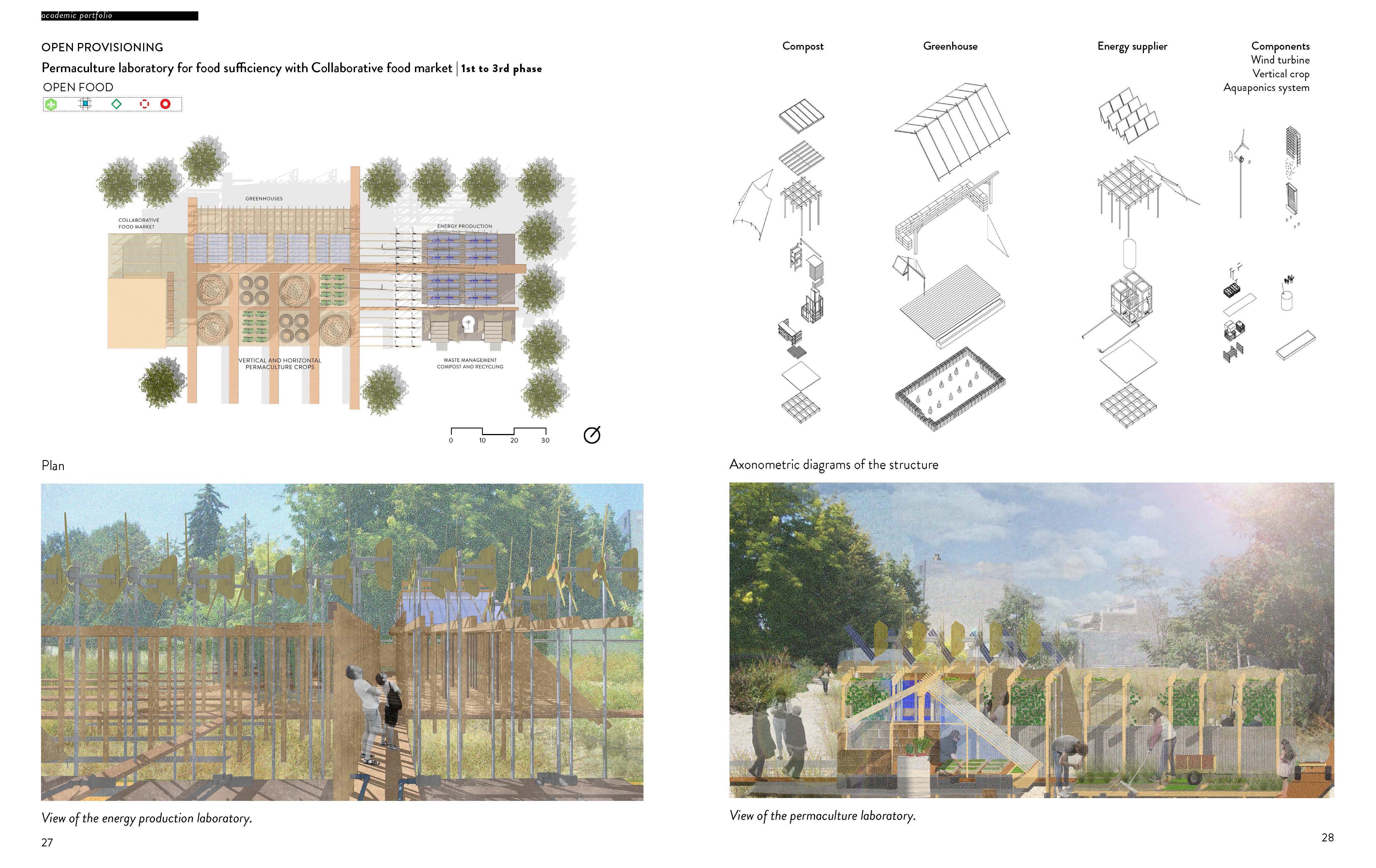

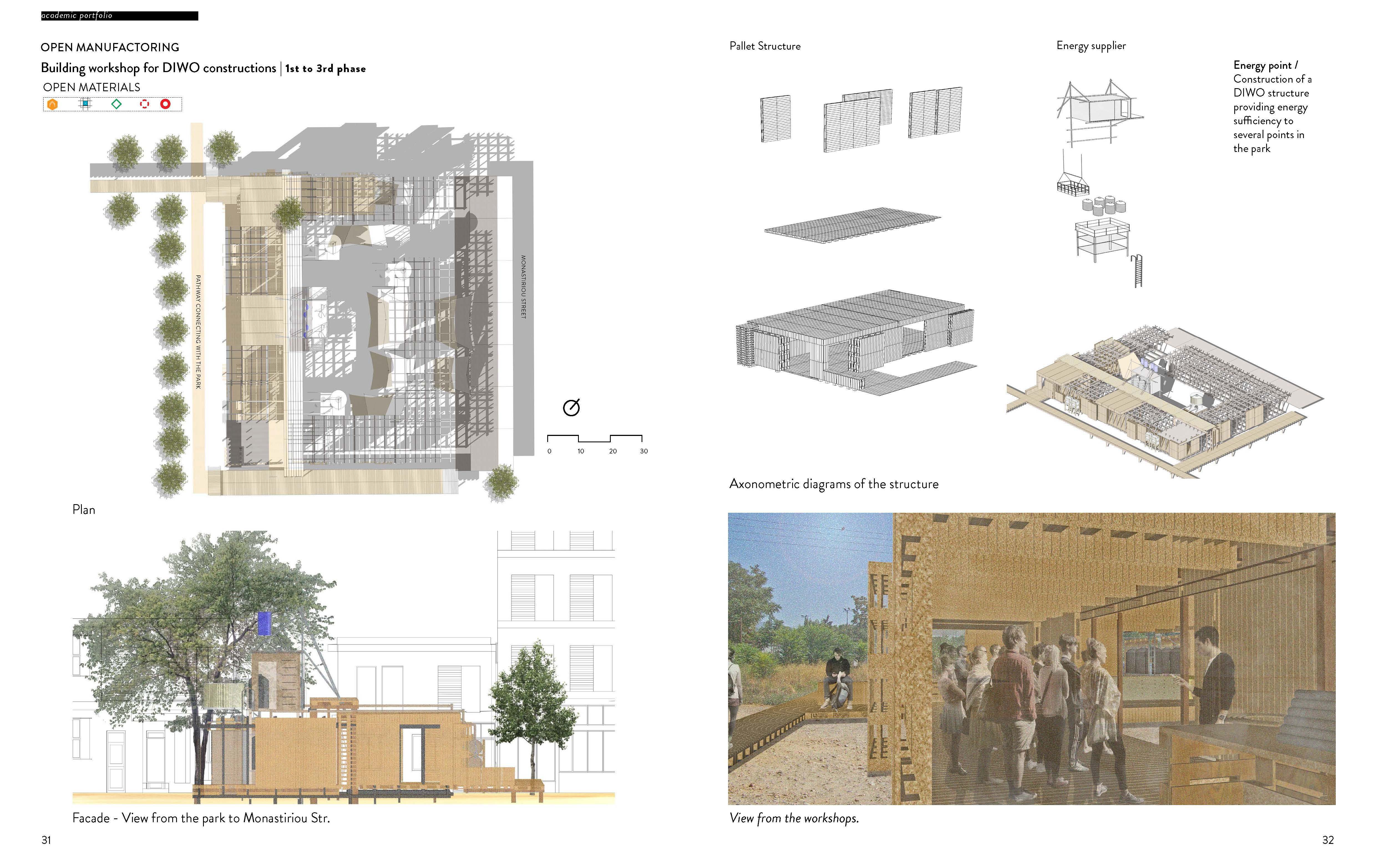



Portfolio of my master’s design project titled “Cooperative Model of Interventions with the Residents of Academia Platonos Park in Athens”, supervised by Prof Panos Dragonas, School of Architecture, University of Patras, Greece (2015).
All images & drawings are product of my work —All rights reserved.
This was a live project in a contested area of the city —Plato’s Academy Park in Athens— and proposed a cooperative model of design interventions based on the concept of a circular economy for the self-management of the park by the communities of residents.
Abstract:
Academia Platonos neighborhood is a contested site depending on the decisions of local authorities to grant permission for numerous developments, sometimes unpopular to the residents, making its future uncertain. As the economic crisis continues the capital of Greece continues to undergo degradation of public spaces.
As a result of the economic degradation, residents are forming participatory and collective
schemes to engage themselves with the city issues and the urban environment they live. In this context short-term, no budget driven strategies employed by different actors and developers, have become of paramount importance.
“Cooperative model of Interventions with the residents” explores an alternative scenario for
the controversial Academia Platonos site in Kolonos, Athens. In stark contrast to the current contested scheme for privatization of part of the area, this alternative proposal has been considered in the context of a 20-year planning proposal.
A number of interventions are happening in phases during the 20 years plan, with the engagement of different participatory schemes, varying from the citizen’s collectives to the public and private sector. This prolonged construction sequence aims to promote long-term thinking in the planning and development of our cities by existing as a constant reference point within the ever changing urban fabric. By anticipating the challenges that the area will face over the next 20 years (new population arrivals, economic restrictions, stricter energy targets, future space exploitation and new models of governance), the intervention strategy addresses questions about the future of architectural practices. To ensure its own longevity, the interventions consist of a series of self-built, self-funded, self-production laboratories (energy, food, structure, living) as its support, exhibiting the evolution of the social, cultural and economic forms.

Photo of the “archaeological garden”(August, 2015)
Community project designed and built with the residents of Academia Platonos:
A design proposal for a small “archaeological garden” was submitted as a result of this academic project, in collaboration with the collective of residents and the local authorities, which was built in 2015/2016 inside the Academia Platonos Park to exhibit the history of Plato’s Academy to the residents and visitors.
 Image from my design thesis and proposal for the
“archaeological garden” (March, 2015)
Image from my design thesis and proposal for the
“archaeological garden” (March, 2015)


Summary of my undergraduate research dissertation titled “Polis, Politics and Ad hoc Urban Practices”supervised by Prof Panos Dragonas, School of Architecture, University of Patras, Greece (2013).
︎︎︎ Link to the full book of the dissertation (in Greek)
My dissertation examined the role of international and local (regional) factors in the economic, political and social transformation of urban space in global cities. The research focused on urban practices and actions of social movements / social groups / collective groups, as one of the most dynamic and transformative factors of contemporary cities. Especially in Athens, during the years 2008-2013, a large variety of collective actions and urban practices were performed, gaining the participation of citizens’ collectives. My thesis explored activities that are spontaneous, unplanned and arose by the initiative of collective groups, in order to intervene in the urban space. It investigates how their intervention practices are diverse and innovative, transforming the urban space locally. Although these collective initiatives are identified to be scattered in the city of Athens, my dissertation focuses on the ways the city’s collective groups unite their action by forming common networks and making their urban practices and the spaces that host them visible throughout the city as urban commons.